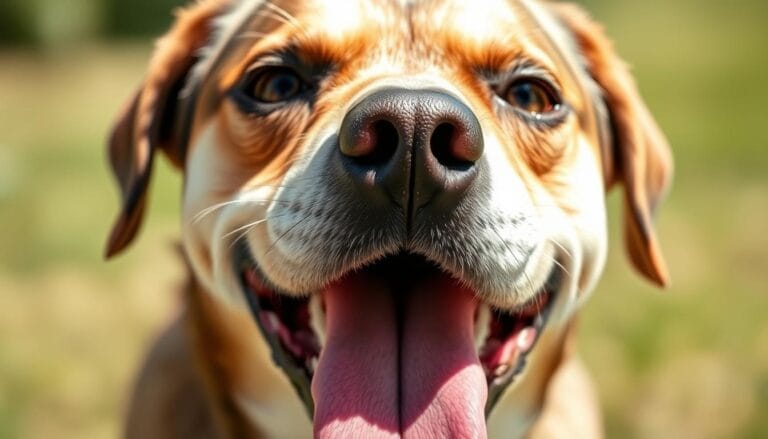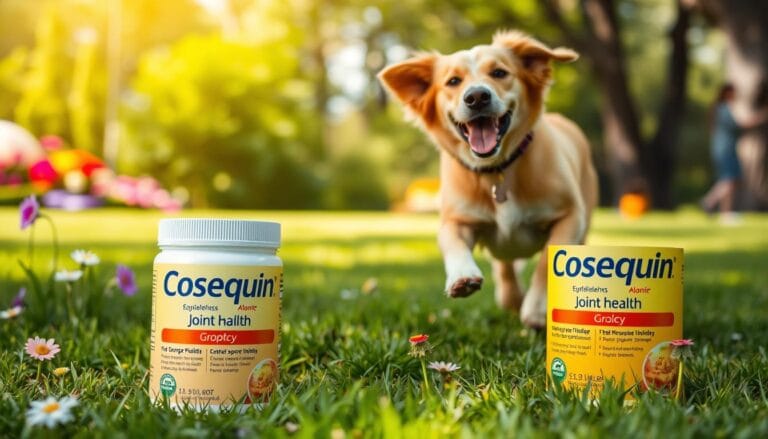Your Dog Has Diarrhea But Seems Fine? Here’s What to Do
If your dog has diarrhea but seems okay, it can be puzzling. As a dog owner, you’re probably worried about your pet’s health. Diarrhea in dogs can stem from many things, like eating something bad, parasites, or stress. My dog has diarrhea but is acting fine, and I’m sure you’re in the same boat, wondering how to help your furry friend.
Dog diarrhea is a common problem many pet owners face. It’s important to know the possible causes and when to see a vet.
Table of Contents
About 10% of dogs may have diarrhea at some point. If your dog has diarrhea but seems fine, it’s key to watch them closely. My dog has diarrhea but is acting fine, and I’ve learned to keep a close eye on their behavior and watch for any signs of distress. Dog diarrhea can signal a bigger health problem, so it’s important to tackle it quickly.
Key Takeaways
- If your dog has diarrhea but is acting fine, monitor their condition closely.
- Dog diarrhea can be caused by dietary indiscretion, parasitic infections, and stress.
- Around 10% of dogs may experience diarrhea at any given time.
- My dog has diarrhea but is acting fine, and it’s essential to keep a close eye on their behavior.
- Dog diarrhea can be a symptom of an underlying health issue, and it’s important to address it promptly.
- Regular veterinary check-ups are essential for maintaining dog health and potentially preventing incidences of diarrhea.
- Keeping a consistent diet and avoiding table scraps can help mitigate the risk of diarrhea.
Understanding Why My Dog Has Diarrhea But Is Acting Fine
If your dog has diarrhea for 3 days but seems fine, it’s key to know why. Diarrhea in dogs can come from many things. This includes mild diet changes, non-severe parasites, and stress. Knowing how to stop dog diarrhea and when to see a vet is important.
Common reasons for mild diarrhea in dogs include eating bad food or swallowing things they shouldn’t. If your dog is healthy but has diarrhea, it might just pass. But, if the diarrhea doesn’t go away or gets worse, you should get vet help.

Common Causes of Mild Diarrhea
- Mild dietary changes
- Non-severe parasitic infections
- Stress-induced diarrhea
It’s also important to know when your dog is okay, even with diarrhea. If your dog is active, eating well, and doesn’t have other symptoms, it’s probably just a short-term issue. But, if you’re not sure how to stop dog diarrhea or if your dog’s condition gets worse, always talk to a vet.
Common Triggers for Canine Diarrhea
As a dog owner, knowing what can make your dog have diarrhea is key. Diarrhea can be caused by many things, like eating garbage, taking certain medicines, or even cancer. Finding out why your dog has diarrhea is important to help them feel better.
Some common reasons for dog diarrhea include dietary indiscretion, like eating bad food or garbage, which is a big problem for 25% of dogs. Food intolerance and allergies also play a role in 10-15% of cases. And, bacterial infections, like salmonella and parvovirus, are responsible for 15-20% of dog diarrhea.
Other possible causes include:
- Sudden changes in diet, which can cause diarrhea in about 30% of dogs
- Medicines that can upset a dog’s stomach and cause diarrhea
- Intestinal cancer, which is more common in older dogs and can lead to diarrhea

Knowing these common causes can help prevent diarrhea in dogs. If your dog has diarrhea, watch their symptoms closely. If it doesn’t get better or if they show other signs like blood in their stool or vomiting, get them to the vet.
Analyzing Your Dog’s Symptoms
When your dog has diarrhea but seems okay, it’s key to check the symptoms. You might find yourself asking, “why would my dog have diarrhea?” The color and texture of their stool can tell you a lot. For example, black, tarry diarrhea might mean bleeding in the upper stomach, while explosive diarrhea can be painful and lead to dehydration quickly. If you’re wondering “why would my dog have diarrhea?”, start by observing their stool closely.
Watching your dog’s symptoms is critical. If you see severe signs, get vet help right away. Here’s what to assess:
Consistency and Color Changes
The stool’s look and feel can answer “why would my dog have diarrhea?” Yellow or gray stool might indicate liver, pancreas, or gallbladder issues. Green stool could stem from eating grass or liver disease. Any change warrants a vet visit.
Frequency of Bowel Movements
Small, frequent stools with mucus or blood suggest large intestine issues. Loose, large stools from the small intestine may cause weight loss. Tracking frequency helps pinpoint “why would my dog have diarrhea?”
Additional Signs to Monitor
Look for tiredness, fever, or dehydration. These could signal serious illness. Even if your dog acts normal, note behavioral shifts.
Immediate Steps to Help Your Dog
Act fast to prevent dehydration. Feed a bland diet (boiled chicken, rice) and provide water. If symptoms persist despite care, revisit “why would my dog have diarrhea?” with your vet to rule out infections or chronic issues.
Dietary Modifications
Here are some dietary changes to help with dog diarrhea:
- Feeding a bland diet of boiled chicken and rice
- Adding probiotics or fiber supplements to their food
- Avoiding foods that are high in fat or sugar
These changes can help firm up your dog’s stool and prevent dehydration.
Hydration Management
Keeping your dog hydrated is also important. Make sure they always have fresh, clean water. Consider adding an electrolyte supplement to their water. Giving small amounts of water often can also help prevent dehydration.
Natural Home Remedies for Dog Diarrhea
When your dog has diarrhea for 3 days, it’s a stressful time. But, there are natural ways to help. Plain canned pumpkin can make your dog’s stool firmer and balance their gut bacteria. Probiotics also help by increasing good bacteria in the digestive system.
Other remedies include fasting for 12-24 hours to calm the stomach. You can also give your dog bland, nutritious foods like banana, boiled potatoes, or plain yogurt. Make sure they drink plenty of water to avoid dehydration. Natural digestive supplements like Fennel or Slippery elm can also aid in recovery.
- Provide a bland diet for no more than 7 days for adult dogs and 2-3 days for growing puppies
- Monitor your dog’s stool quality and frequency
- Watch for signs of dehydration, such as excessive thirst, dark urine, or dry gums
- Consult with a veterinarian if your dog’s diarrhea persists or worsens
Remember, natural remedies can help with dog diarrhea. But, always talk to a vet before trying new remedies, if your dog has health issues or is on medication. With your vet’s help and natural remedies, you can help your dog feel better and prevent future diarrhea.
When to Contact Your Veterinarian
If your dog has diarrhea, watch them closely. Look for severe symptoms that need vet care. There are many reasons for dog diarrhea, like diet changes, infections, or health issues.
Signs that mean you should call the vet include bloody diarrhea, vomiting, feeling tired, and not wanting to eat. If you’re not sure about your dog’s health, it’s safer to talk to a vet. They can find out why your dog has diarrhea and tell you how to treat it.
Diarrhea can sometimes mean a serious problem, like parvovirus or parasites. If you see these symptoms, get vet help right away:
- Bloody diarrhea
- Vomiting
- Lethargy
- Loss of appetite
- Signs of dehydration
If your dog has diarrhea and you’re not sure what to do, call a vet. They can give you advice and help figure out the best treatment for your dog.
Prevention Strategies for Future Episodes
As a dog owner, it’s key to prevent future dog diarrhea episodes. If your dog has diarrhea but seems okay, find out why and change their habits. A balanced diet and lots of water keep their digestive system healthy and lower diarrhea risk.
To lower the chance of future episodes, try these prevention tips:
- Avoid triggers such as eating garbage or spoiled food
- Manage stress and anxiety through regular exercise and playtime
- Monitor your dog’s eating and drinking behavior for any changes
Also, adding prebiotics and probiotics to their diet can help with digestion and recovery from diarrhea. Keep an eye on your dog’s health and see a vet if you notice persistent or severe symptoms, like blood in stool or dehydration. By taking these steps, you can reduce the number and severity of my dog has diarrhea but is acting fine episodes and ensure your dog’s happiness and health.
Remember, every dog is different. It’s vital to work with your vet to find the best prevention plan for your dog. Together, you can keep their digestive system healthy and avoid future diarrhea episodes.
Diet and Nutrition Tips for Sensitive Stomachs
Managing your dog’s sensitive stomach starts with diet and nutrition. To stop dog diarrhea, a bland diet is key. Boiled chicken and rice are great because they’re easy to digest and firm up stool.
Stay away from fatty foods, as they can cause pancreatitis and diarrhea. Choose a balanced diet that fits your dog’s needs. Adding probiotics to their food can also help with digestion.
Best Foods for Recovery
Here are some top foods for dogs with diarrhea:
- Boiled chicken and rice
- Pumpkin and sweet potatoes
- Green beans and carrots
Foods to Avoid
These foods can make diarrhea worse in dogs:
- Fatty foods like bacon and sausage
- High-fiber foods like beans and cabbage
- Spicy foods like onions and garlic
By sticking to these diet tips, you can help your dog feel better. Always talk to your vet for specific advice on your dog’s sensitive stomach.
Understanding the Recovery Process
If your dog has diarrhea for 3 days, watch them closely. The recovery time depends on why they have diarrhea. If it’s from a small change in diet or stress, they might get better with little help.
But, if the diarrhea doesn’t go away, finding the cause is key. Research shows that long-lasting diarrhea might need a vet’s help. Also, dogs at risk of dehydration need special care.
Important things to think about during recovery include:
- Keeping them hydrated to avoid dehydration
- Making diet changes to ease their stomach
- Watching for any changes in their health
When your dog has diarrhea for 3 days, talk to your vet. They can help your dog feel better and get back to normal.
If your dog has diarrhea and shows signs of dehydration, vomiting, or blood, see a vet right away. Understanding how to help your dog recover and working with your vet can make them feel better and prevent future diarrhea.
Conclusion: Managing Your Dog’s Digestive Health
Keeping your dog’s digestive system healthy is key to avoiding diarrhea. A balanced diet, plenty of water, and avoiding certain foods can help. If your dog has diarrhea, seeing a vet quickly is important to find and treat the cause.
If your dog has mild diarrhea for less than 48 hours, you might be able to manage it at home. But, if it lasts longer or is severe, with symptoms like vomiting or lethargy, you need to see a vet fast. This is to prevent dehydration and other serious issues. By following your vet’s advice and the tips in this article, you can help your dog stay healthy and happy.
FAQ
What are the common causes of mild diarrhea in dogs?
Mild diarrhea in dogs can be caused by many things. These include changes in their diet, mild parasitic infections, and stress.
How can I tell if my dog’s diarrhea is just temporary?
If your dog’s diarrhea doesn’t last long and they seem fine, it might just be a short-term issue. But, if it keeps happening or they show other signs of illness, you should see a vet.
What are some common triggers for canine diarrhea?
Dogs can get diarrhea from eating things they shouldn’t, like garbage. Certain medicines and even cancer can also cause it.
How can I analyze my dog’s symptoms to determine the severity of the diarrhea?
Looking at your dog’s stool can tell you a lot. Black, tarry stool might mean bleeding in the upper gut. Explosive diarrhea can be very painful and lead to dehydration fast.
What are some immediate steps I can take to help manage my dog’s diarrhea?
To help your dog, try a bland diet and make sure they drink lots of water. This can help their stool and prevent dehydration. Always watch for any severe signs and see a vet if needed.
Are there any natural home remedies that can help with my dog’s diarrhea?
Yes, things like plain canned pumpkin and probiotics can help. They can make your dog’s stool firmer and balance their gut bacteria. But, always check with a vet first to make sure they’re safe and right for your dog.
When should I contact my veterinarian for my dog’s diarrhea?
If your dog’s diarrhea is severe, like bloody or explosive, or if they’re vomiting or acting tired, get vet help right away. Also, watch for black stool, explosive diarrhea, or dehydration signs.
How can I prevent future episodes of diarrhea in my dog?
To avoid diarrhea, feed a balanced diet and make sure they drink enough water. Avoiding garbage and other bad foods can also help keep their gut healthy.
What dietary considerations are important for dogs with sensitive stomachs?
Dogs with sensitive stomachs need a special diet. A bland diet and avoiding fatty foods can help. Also, slowly introducing new foods can prevent upset stomachs.
How long does the recovery process typically take for dogs with diarrhea?
How long it takes for a dog to get better depends on why they have diarrhea. Mild cases might get better quickly. But serious issues like cancer could take longer and need more treatment.
There are no reviews yet. Be the first one to write one.







